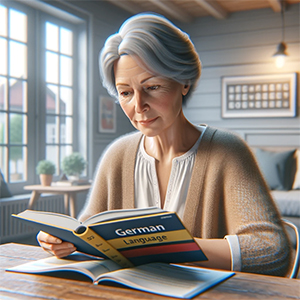German Lesson 11
Seasons

My name is Ewa, and I am happy to welcome you to the next lesson of our German course. This morning greeted me with a cool but bright sunshine, which reminded me how important it is to change the seasons. And this is the main topic of our lesson today: German for caregivers – Seasons.
As a caregiver for the elderly, you often plan activities related to different seasons, whether in Poland or as part of your work at care agencies in Germany. Today we will focus on vocabulary to help you talk about these changes and tailor care to the needs of seniors depending on the time of year.
German vocabulary for carers
Here are 10 words related to the seasons that we will learn today:
- Spring – der Frühling
- Summer – der Sommer
- Autumn – der Herbst
- Winter – der Winter
- Leaf – das Blatt
- Snow – der Schnee
- The Sun – die Sonne
- Rain – der Regen
- Flower – die Blume
- Frost – der Frost
These words will be key for us in today’s exercises and dialogues. Get ready for interesting assignments that will allow you to better understand and use new vocabulary in practice!
Example dialogues – everyday phrases and expressions
Dialogue 1: The Year in the Garden
Ewa: “Herr Martin, welche Blumen mögen Sie am liebsten im Frühling pflanzen?” (Mr. Martin, what flowers do you like most to plant in the spring?)
Martin: „Ich liebe Tulpen und Narzissen. Sie bringen eine Farben in den Garten nach dem langen Winter.”(I love tulips and daffodils. They bring colors to the garden after a long winter.)
Dialogue 2: Music and Memories
Ewa: „Sie haben erwähnt, dass Sie klassische Musik mögen. Haben Sie einen Lieblingskomponisten?” (You mentioned that you like classical music. Do you have a favorite composer?)
Martin: “Ja, Beethoven, ist mein Favorit. Seine Musik erinnert mich a meine Jugend.” (Yes, Beethoven is my favorite composer. His music reminds me of my youth.)
Dialogue 3: Daily Care Routine
Ewa: “Herr Martin, ich möchte Ihren Tagesablauf besser verstehen. Um wie viel Uhr stehen Sie normalerweise auf?” (Mr. Martin, I would like to better understand your daily routine. What time do you usually get up?)
Martin: “Normalerweise stehe ich gegen 7 Uhr auf. Aber manchmal schlafe ich länger, wenn ich nachts nicht gut schlafe.” (I usually get up around 7 a.m. But occasionally, I sleep longer if I sleep badly at night.)
These dialogues help to create a realistic picture of everyday life in the care of an elderly person, while enriching the German vocabulary of caregivers. Ewa, thanks to her empathy and willingness to learn, finds herself perfectly in the role of babysitter and student, and Mr. Martin, with his warm character and interests, becomes not only a mentee, but also a friend.
Interactive Exercises: Strengthening Language Skills
Task 1: Planning a Day with Seasonal Vocabulary

Objective: To use vocabulary related to the seasons in the context of planning the daily activities of the caregiver of the elderly.
Task Description: Create a day plan for the caregiver, considering the different seasons of the year. Use vocabulary related to the seasons we discussed in class. The plan should include various activities related to the care of the elderly, such as walking, gardening or indoor activities in winter.
Example–Im Frühling: Morgenspaziergang im Park. Im Sommer: Nachmittags im Garten sitzen und die Blumen gießen. Im Herbst: Das Laub zusammenkehren. I’m Winter: Gemütliche Stunden mit Tee und Musik im Wohnzimmer.(In spring: Morning walk in the park. Summer: Afternoon in the garden, watering the flowers. Autumn: Leaf picking. Winter: Cozy moments with tea and music in the living room)
Task 2: Creating Dialogue in the Context of Care
Objective: Practical use of German in simulated conversations related to the care of an elderly person.
Task Description: Write a short dialogue between the caregiver and the elderly person who relates to everyday activities or health issues related to different seasons of the year. Focus on vocabulary that will help express your concern and understanding of the needs of your senior.
Example-Ewa: Herr Schmidt, brauchen Sie eine zusätzliche Decke? Es wird kälter im Herbst. (Mr. Schmidt, do you need an extra blanket? Autumn is getting colder.)
Herr Schmidt: Ja, bitte. Und könnten Sie das Fenster schließen? Es zieht ein bisschen. (Yes, please. And would you mind closing the window? There’s a little draught.)
Discover with us: Fascinating aspects of German
Did you know that the word Frühling comes from the Old High German word Fruhling, which literally means early? This refers to the fact that spring is the time of year when the days get longer and nature awakens to life after a winter sleep. In German culture, spring is a symbol of renewal and new beginnings, which is particularly important in the care of the elderly. This is a time when our seniors often feel more energetic and ready for new activities, which is significant for both their physical and mental health.
In German, there are also many sayings and phrases related to spring, such as Frühlingserwachen, or spring awakening, which perfectly reflects the atmosphere of revival and growth that prevails during this period.
For caregivers of the elderly, spring is the perfect time to plan outdoor activities that can benefit the well-being and health of seniors. Understanding this symbolism in German can help you tailor care even better to the needs of your mentee at this beautiful time of year.
Summary of Lesson 11: German for caregivers– Seasons
Dear learners, discovering the German language offers many fascinating aspects, especially when they are directly related to the care of seniors. Have you ever wondered how deeply the German language has penetrated into the welfare sphere? For example, the word Frühling (spring) takes on special significance in the context of care for the elderly. It symbolizes renewal and new beginnings, which is reflected in the improved well-being of seniors with the arrival of warmer days. Such language knowledge not only enriches your communication, but also allows you to better understand the emotions and needs of your caregivers, which is key to building effective care relationships.
Invitation to the Next Lesson
I can’t wait to meet you at our next lesson, called Simple Questions and Answers. This meeting will be of great importance as it focuses on the fundamental elements of communication that are necessary in the daily work of the caregiver. The ability to ask simple questions and understand answers in German can greatly facilitate interactions with seniors, helping to better understand their needs and expectations. As a result, this knowledge of the language directly translates into a higher quality of care, which is our main goal. See you soon – keep learning and remember that every lesson is a step forward in your career as a caregiver. Bis bald! (See you soon!)